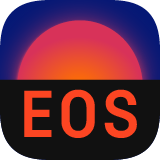EOS is a software package that addresses several use cases in the field of high-energy flavor physics (HEP):
- calculation and uncertainty estimation of flavour observables within the Standard Model or within the Weak Effective Theory;
- Bayesian inference of parameters from both experimental and theoretical constraints; and
- Monte Carlo simulation of flavour processes.
An up-to-date list of High Energy Physics publications can be found here.
EOS is written in C++14, with an recommended interface to Python 3, and depends on as a small set of external software libraries:
- the GNU Scientific Library (libgsl),
- a subset of the BOOST C++ libraries,
- the Hierarchical Data Format v5 library (libdf5),
- the Population Monte Carlo (PMC) library pmclib (optional),
- the Python 3 interpreter.
For details on these dependencies we refer to the online documentation.
EOS supports several methods of installation. For Linux users, the recommended method
is installation via PyPI: pip3 install eoshep. For macOS users the documentation details
instructions to use the homebrew software repositories to install EOS and its dependencies.
For instructions on how to build and install EOS on your computer please have a look at the online documentation.
The main authors are:
- Danny van Dyk danny.van.dyk@gmail.com,
- Frederik Beaujean beaujean@mpp.mpg.de,
- Christoph Bobeth christoph.bobeth@gmail.com,
- Nico Gubernari nicogubernari@gmail.com,
- Meril Reboud reboud@gmail.com,
with further code contributions by:
- Marzia Bordone,
- Thomas Blake,
- Elena Graverini,
- Stephan Jahn,
- Ahmet Kokulu,
- Stephan Kürten,
- Philip Lüghausen,
- Bastian Müller,
- Stefanie Reichert,
- Eduardo Romero,
- Rafael Silva Coutinho,
- Ismo Tojiala,
- Keri Vos,
- Christian Wacker.
We would like to extend our thanks to the following people whose input and support were most helpful in either the development or the maintenance of EOS:
- Gudrun Hiller
- David Leverton
- Ciaran McCreesh
- Hideki Miyake
- Konstantinos Petridis
- Alexander Shires
For additional information, please contact any of the main authors. If you want to report an error or file a request, please file an issue here.
